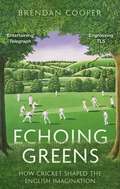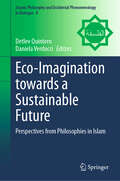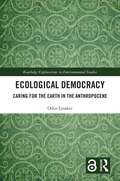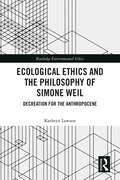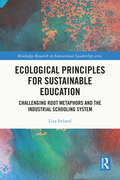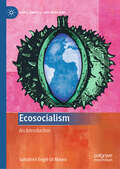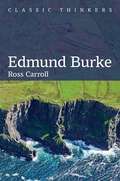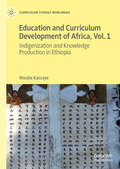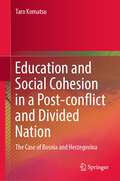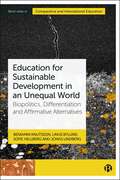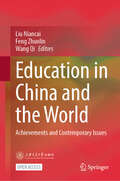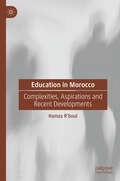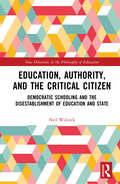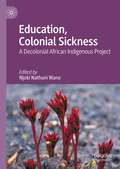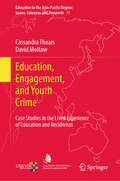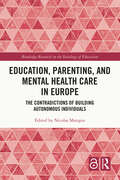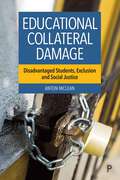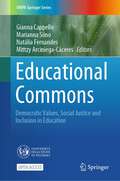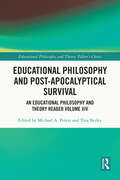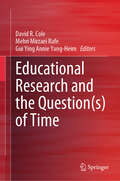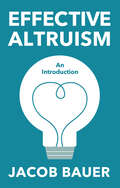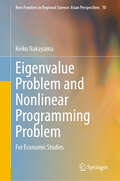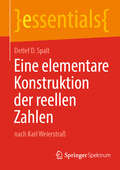- Table View
- List View
Echoing Greens: How Cricket Shaped the English Imagination
by Brendan CooperThe importance of cricket to England has been immortalised in the art and literature of a thousand years. For countless artists and writers across the centuries, the culture and aesthetics of cricket - white-clad players, the crack of bat on ball, booming appeals, admiring applause, figures running up to bowl, batsmen leaning, waiting, swinging the blade - have been as essential to the English landscape as the hills and meadows immortalised by Gainsborough, Constable and Turner.It is a story that is known in part, but one that has never been explored in full. And it is lined with surprises, forgotten tales and unnoticed details - ranging from medieval manuscript illustrations, through a dazzling variety of visual art, poetry, fiction and drama, to recent portraits of contemporary heroes.Echoing Greens is a fascinating and thoughtful exploration of the bond between cricket and the English imagination. It unveils that beneath cosy patriotic dreams of 'English values', a much wilder, more complex story exists. Alongside stories of heroic figures, noble values, and pastoral idylls, the literature and the art of cricket also tell of vice, violence, and scandal. The result is a thrilling investigation into the true story behind these representations of the game, and forces us to reconsider the history of cricket itself.
Echoing Greens: How Cricket Shaped the English Imagination
by Brendan CooperThe importance of cricket to England has been immortalised in the art and literature of a thousand years. For countless artists and writers across the centuries, the culture and aesthetics of cricket - white-clad players, the crack of bat on ball, booming appeals, admiring applause, figures running up to bowl, batsmen leaning, waiting, swinging the blade - have been as essential to the English landscape as the hills and meadows immortalised by Gainsborough, Constable and Turner.It is a story that is known in part, but one that has never been explored in full. And it is lined with surprises, forgotten tales and unnoticed details - ranging from medieval manuscript illustrations, through a dazzling variety of visual art, poetry, fiction and drama, to recent portraits of contemporary heroes.Echoing Greens is a fascinating and thoughtful exploration of the bond between cricket and the English imagination. It unveils that beneath cosy patriotic dreams of 'English values', a much wilder, more complex story exists. Alongside stories of heroic figures, noble values, and pastoral idylls, the literature and the art of cricket also tell of vice, violence, and scandal. The result is a thrilling investigation into the true story behind these representations of the game, and forces us to reconsider the history of cricket itself.
Eco-Imagination towards a Sustainable Future: Perspectives from Philosophies in Islam (Islamic Philosophy and Occidental Phenomenology in Dialogue #8)
by Detlev Quintern Daniela VerducciThe Volume brings together scholars from Azerbaijan, Egypt, Germany, India, Iran, Iraq, Italy, the Netherlands, and Turkey to approach the new field of Eco-Imagination from various philosophical and disciplinary backgrounds. Sufism and its Micro-Macro philosophy in Ikhwan al-Safa, Ibn Arabi, Suhrawardy, Nishabouri, and Mulla Sadra are in dialogue with the Logos of Life Philosophy founded by Anna-Teresa Tymieniecka (1923 – 2014). This book provides a multi-perspective insight into the understanding of Life in Islamic Philosophies. Philosophers, mystics, and poets from a variety of Islamic countries, schools, and worldviews are introduced and debated. Sustainable futures evolved in harmony with everything there is alive (Anna-Teresa Tymieniecka), are currently more threatened than ever. Wars, ecological destructivity, the climate crisis, and not least the crisis of the Human Being call urgently for a cross-religious, cultural, and generational understanding. Lively debates in Islam, taking place on philosophical problems for hundreds of years, often based on the same roots as in Occidental Phenomenology, e.g., Plato, Aristotle, and Plotinus, are still too little known in the Occident/West. The prolific and poetic arguments, introduced for the first time in an eco-imaginative horizon, do not belong to the past. This volume invites students and researchers to uncover Islamic Philosophies’ potentialities for a shared sustainable future.
Ecological Democracy: Caring for the Earth in the Anthropocene (Routledge Explorations in Environmental Studies)
by Odin LysakerRe-Imagining Ecological Democracy offers an original, thought-provoking, and engaging treatment of why and how democracy should be re-imagined in reaction to today’s ecological crisis. The book explains that one need to re-imagine both the view on nature and democratic ideals within the same framework in the Anthropocene, the present geological epoch of human-made instability in the Earth system and its planetary boundaries. This book proposes unique and challenging readings of green political theory and its development of ecological democracy in the last four decades. The book is the first to offer a systematic and detailed interpretation of the role of critical theory vis–à–vis green political theory through an update regarding current non-anthropocentric critical theorists and how they may contribute to the further development of ecological democracy. Re-Imagining Ecological Democracy builds further on deep ecology, ecophenomenology, and animism by articulating an ecocentric view on nature which defends an intrinsic moral value of all existence as well as formulating the democratic principle of all ecologically affected parties. This book provides a sophisticated, convincing, and accessible argument for how to re-imagine ecological democracy as ecocentrism in practice: ecological love. To love ecologically means caring for and encountering all existence on the Earth and in the cosmos. This book is multi-disciplinary and will be of great value to researchers as well as undergraduate and postgraduate students from many disciplines.
Ecological Democracy: Caring for the Earth in the Anthropocene (Routledge Explorations in Environmental Studies)
by Odin LysakerEcological Democracy offers an original, thought-provoking, and engaging treatment of why and how democracy should be re-imagined in reaction to today’s ecological crisis. The book explains that one need to re-imagine both the view on nature and democratic ideals within the same framework in the Anthropocene, the present geological epoch of human-made instability in the Earth system and its planetary boundaries. This book proposes unique and challenging readings of green political theory and its development of ecological democracy in the last four decades. The book is the first to offer a systematic and detailed interpretation of the role of critical theory vis-à-vis green political theory through an update regarding current non-anthropocentric critical theorists and how they may contribute to the further development of ecological democracy. Ecological Democracy builds further on deep ecology, ecophenomenology, and animism by articulating an ecocentric view on nature which defends an intrinsic moral value of all existence as well as formulating the democratic principle of all ecologically affected parties.This book provides a sophisticated, convincing, and accessible argument for how to re-imagine ecological democracy as ecocentrism in practice: ecological love. To love ecologically means caring for and encountering all existence on the Earth and in the cosmos. This book is multi-disciplinary and will be of great value to researchers as well as undergraduate and postgraduate students from many disciplines.The Open Access version of this book, available at http://www.taylorfrancis.com, has been made available under a Creative Commons [Attribution-Non Commercial-No Derivatives (CC-BY-NC-ND)] 4.0 license.
Ecological Ethics and the Philosophy of Simone Weil: Decreation for the Anthropocene (Routledge Environmental Ethics)
by Kathryn LawsonThis book places the philosophy of Simone Weil into conversation with contemporary environmental concerns in the Anthropocene.The book offers a systematic interpretation of Simone Weil, making her ethical philosophy more accessible to non-Weil scholars. Weil’s work has been influential in many fields, including politically and theologically-based critiques of social inequalities and suffering, but rarely linked to ecology. Kathryn Lawson argues that Weil’s work can be understood as offering a coherent approach with potentially widespread appeal applicable to our ethical relations to much more than just other human beings. She suggests that the process of "decreation" in Weil is an expansion of the self which might also come to include the surrounding earth and a vast assemblage of others. This allows readers to consider what it means to be human in this time and place, and to contemplate our ethical responsibilities both to other humans and also to the more-than-human world. Ultimately, the book uses Weil’s thought to decanter the human being by cultivating human actions towards an ecological ethics.This book will be useful for Simone Weil scholars and academics, as well as students and researchers interested in environmental ethics in departments of comparative literature, theory and criticism, philosophy, and environmental studies.
Ecological Principles for Sustainable Education: Challenging Root Metaphors and the Industrial Schooling System (Routledge Research in Educational Leadership)
by Liza IrelandThis book explores how the education sector can transition to being truly sustainable and why necessary innovations for educational change are being subverted and undermined when mapped onto the existing industrial educational system.Based on PhD case study research with schools that are modelling and teaching sustainability, action research, and the author’s 40 years of working in the K-12 system, this volume examines how education continues to perpetuate the status quo, and why education innovations are thus undermined. It shows the importance of redesigning education based on the principles of sustainable living systems and explores how this can be achieved across all levels of the educational system. The first part of the book establishes a new vision of sustainable education, whilst the second brings to light the industrial mechanistic root metaphors in current practice across leadership and administration, buildings and grounds, curriculum design, teaching, and learning that are subverting innovative efforts. From understanding the foundational, influential, problematic root metaphors of our "Industrial" educational system, it moves to explore how the ecological principles of sustainability can be used to rethink and redesign an educational system, from its administration, leadership, and policy, to curriculum, buildings, grounds and resources, through to teaching and learning, that will support sustainability, innovation, and creativity, developing systems thinking and sustainability as a frame of mind.Exploring how the education sector can transition to being truly sustainable and find new ways to traverse the problematic "Industrial" world view at this pivotal moment, will appeal to administrators, post-secondary educators, policymakers, and researchers and scholars of sustainability education, educational leadership, curriculum design, and educational philosophy.
Ecosocialism: An Introduction (Marx, Engels, and Marxisms)
by Salvatore Engel-Di MauroThis book offers an extensive critical overview of eco-socialism, one of the most generative and significant aspects of contemporary debates within socialism. Marxism has played a foundational role in the development of ecosocialism since its inception and has also led to critical reflections on the 20th century Marxism and ecological interpretation of Marxist writings. Despite the relevance of ecosocialism to the pressing debates on the ecological crisis and the growing literature on ecosocialism, there has not been a comprehensive account on ecosocialism and its variations. This volume seeks to fill this important gap and to pave the way for a more systematic development of this emerging paradigm. The book not only engages with a critique of other non-socialist ecological schools of thought in defence of ecosocialism, but also provides a critical overview of debates within ecosocialism and of ecosocialism itself. The latter includes an appraisal of ecosocialism in Bolivarian Venezuela and the implications of current efforts in the People's Republic of China to build an ecological civilisation. Furthermore, the book contains a crucial discussion about the relation between eco-socialism and indigenous studies and movements.
Edmund Burke (Classic Thinkers)
by Ross CarrollFew thinkers have provoked such violently opposing reactions as Edmund Burke. A giant of eighteenth-century political and intellectual life, Burke has been praised as a prophet who spied the terror latent in revolutionary or democratic ideologies, and condemned as defender of social hierarchy and outmoded political institutions. Ross Carroll tempers these judgments by situating Burke’s arguments in relation to the political controversies of his day. Burke’s writings must be understood as rhetorically brilliant exercises in political persuasion aimed less at defending abstract truths than at warning his contemporaries about the corrosive forces – ideological, social, and political – that threatened their society. Drawing on Burke’s enormous corpus, Carroll presents a nuanced portrait of Burke as, above all, a diagnostician of political misrule, whether domestic, foreign, or imperial. Burke’s lasting value, Carroll argues, derives less from the content of his specific positions than from the difficult questions he forces us to ask of ourselves. This engaging and illuminating account of Burke’s work is a vital reference for students and scholars of history, philosophy, and political thought.
Education and Curriculum Development of Africa Vol. 1: Indigenization and Knowledge Production in Ethiopia (Curriculum Studies Worldwide)
by Woube KassayeThis book, the first of two volumes, focuses on the conceptualization of Indigenous Knowledge and Curriculum, Ethiopian/African Philosophy and the possibilities of Indigenization/Africanization of African Education. Its main purpose is to overview the practices of traditional/indigenous education of Africa with emphasis on Ethiopia’s experience connected with curriculum development, and make possible suggestions that could contribute to curriculum development endeavors of Africa. The cultural heritage of the majority African countries is either ignored or not adequately considered in the formulation of educational policies and curricula in their modern African educational systems. Hence, a new path and paradigm shift are needed. To this end, considering Africa's outstanding IK with useful experiences of other countries in education particularly in the curriculum is critical to bring the required change.
Education and Social Cohesion in a Post-conflict and Divided Nation: The Case of Bosnia and Herzegovina
by Taro KomatsuThis book discusses education’s role of developing social cohesion in a post-conflict environment where tensions continue to exist between the three “constituent” ethnic groups. It offers fresh insights into the relationship between education and social cohesion in a specific context of Bosnia & Herzegovina, where the need to rebuild social trust is acutely felt. This book first elaborates the concept of social cohesion and illustrates possible mechanisms through which education can develop, or further erode, social cohesion in already divided societies. Then, it carefully examines such mechanisms, using a case study of a Bosnia & Herzegovina which witnessed violent conflict instigated by ethno-identity politics during 1992-1995, and has been struggling to reconstruct its broken social fabric since then.
Education for Sustainable Development in an Unequal World: Biopolitics, Differentiation and Affirmative Alternatives (Bristol Studies in Comparative and International Education)
by Sofie Hellberg Jonas Lindberg Beniamin Knutsson Linus BylundEducation for Sustainable Development (ESD) is recurrently depicted as an enterprise that unites humanity in a common pursuit of a more just and sustainable world. But how is this enterprise pursued on a planet that is enormously unequal? Drawing on biopolitical theory and rich empirical data from different contexts around the world, this book explores how ESD is unpacked depending on whether people are rich or poor. The book demonstrates how ESD is adapted to the lifestyles and living conditions of different populations. The implication of this depoliticized sensitivity to local ‘realities’, the book argues, is that inequality becomes accommodated and that different responsibilities are assigned to rich and poor. Ultimately, the book considers alternatives to this biopolitical divide.
Education in China and the World: Achievements and Contemporary Issues
by Qi Wang Niancai Liu Zhuolin FengThis open access book provides a comprehensive overview of education in China, covering 12 critical topics including basic education, higher education, professional education, STEM (Science, Technology, Engineering, and Mathematics) education, mental health education, and international education and excellence initiatives. Drawing from current research, theoretical literature, and real-life stories, this book examines the developmental trajectories, achievements, and best practices in the above-mentioned topics, to reflect realities of education transformation in China. It also incorporates a global comparison of key indicators to explore strengths of and gaps in Chinese education with its global counterparts. Setting its context in an ever-changing world, this book intends to explore conceptual support to develop “a modern education system with Chinese features and world standards”, to provide implications for further developing quality education in all sectors, and to promote understanding and inspire critical discussion on education development in China and around the world. This book serves as a valuable resource for students, scholars, and policy makers in the field of education studies, as well as for the general public who are interested in Chinese education.
Education in Morocco: Complexities, Aspirations and Recent Developments
by Hamza R'boulThis book provides a comprehensive overview of historical and postmodern developments in the Moroccan education system, in order to construct a deeper understanding of its structural, linguistic and epistemic complexities. The chapters provide readers with a nuanced grasp of education and its intersections with wider geopolitical, sociopolitical and sociocultural conditions in Morocco as a postcolonial Southern country which is actively seeking to consolidate its position internationally. Covering education from primary school to university, the book features critical reflections on topics such as language-in-education, policy and planning, the politics of education, globalization and nationalist rhetoric. The book is an important reference for anyone interested in understanding the complexities of the education system in Morocco, and more specifically students and scholars who are interested in the sociology of education as well as education and language policy and planning.
Education, Authority, and the Critical Citizen: Democratic Schooling and the Disestablishment of Education and State (New Directions in the Philosophy of Education)
by Neil WilcockThis book offers a unique analysis of the tension between the individual and society in educational contexts, and the role that citizenship and democratic education can play. It approaches the question from two different perspectives – the institutional and the interactional – and argues that any solution must answer the tension from both or it will necessarily fail. The answer is found through a political methodology that places education at the centre and concludes that a balance can be found if we embrace the federated disestablishment of education and state and internally democratic schooling that aims to realise the emancipation of the political child. The book situates itself in the tradition of political philosophy that is education focused, identifying an unresolved tension between the individual and society in the works of Rousseau, Dewey, and Freire. It discusses the concept of authority as a primary issue persisting in this tension. It does so by exploring both interactional and institutional responses based on the idea of the free individual and cooperative associations. The author advocates an education system that creates the necessary space for the cultivation of the free individual and is run by the principles of internally democratic schooling. With a strong focus on citizenship and the role of education in the development of social justice-oriented citizens, this book will be of great interest to researchers, academics, and postgraduate students in the fields of philosophy of education, political philosophy, educational theory, and citizenship education.
Education, Colonial Sickness: A Decolonial African Indigenous Project
by Njoki Nathani WaneIn the last two decades, we have witnessed the quest for decolonization; through research, writing, teaching, and curriculum across the globe. Calls to decolonize higher education have been overwhelming in recent year. However, the goal of decolonizing has evolved past not only the need to dismantle colonial empires but all imperial structures. Today, decolonization is deemed a basis for restorative justice under the lens of the psychological, economic, and cultural spectrum. In this book, the editor and her authors confront various dimensions of decolonizing work, structural, epistemic, personal, and relational, which are entangled and equally necessary. This book illuminates other sites and dimensions of decolonizing not only from Africa but also other areas. This convergence of critical scholarship, theoretical inquiry, and empirical research is committed to questioning and redressing inequality in contemporary history and other African studies. It signals one of many steps in a bid to consultatively examine how knowledge and power have been both defined and subsequently denied through the sphere of academic practice.
Education, Engagement, and Youth Crime: Case Studies in the Lived Experience of Education and Recidivism (Education in the Asia-Pacific Region: Issues, Concerns and Prospects #71)
by Cassandra Thoars David MoltowThis book presents insights into how affective educational experiences may be associated with youth criminal behaviour and the pathway to recidivism. It explores the perspectives and lived school experiences of five young adult male prison inmates, including while they were incarcerated as youths. Through these case studies, the book explores the relationship between affective engagement in education and recidivism.This book shows that participants were affectively disengaged from education prior to their initial incarceration in a youth detention facility, and that their disaffection before, during, and after youth incarceration both generated and impacted on their cognitive and behavioural disengagement from education. Moreover, a range of additional factors not directly causally related to their schooling were shown to have had a significant effect on their engagement in education. The book considers a number of key findings. First, the foundational role that a sense of belonging plays in how young people experience education and its relation to crime. Second, the importance of individualized transition plans for youth at risk, and youth offenders before, during, and after incarceration. Third, the extent to which successful transition from youth offending and recidivism hinges on interagency collaboration. This book will be beneficial to teacher educators, education researchers, criminologists and sociologists.
Education, Parenting, and Mental Health Care in Europe: The Contradictions of Building Autonomous Individuals (Routledge Research in the Sociology of Education)
by Nicolas MarquisThis edited collection investigates, from a sociological perspective, what it means to create an autonomous individual through a novel exploration of three central fields of sociology: education, mental health care, and parenting.By linking these three aspects through their contribution to the building of an autonomous child, the volume analyses the intersecting roles of parent, teacher, and caregiver as well as the transformations in identities of child, pupil, and patient to understand the construction and repair of autonomy. Using a comparison of various case studies across Scandinavian, English-speaking, and French-speaking countries, chapters explore why personal autonomy is so important in many societies and demonstrate the conceptual and practical challenges the idea brings. Ultimately, the book provides an innovative contribution to the fields of educational sociology and the philosophy of education, as well as parenting studies and the sociology of mental health by making the case for taking autonomy, and its paradoxes, seriously.This cross-disciplinary volume will be of interest to scholars, researchers, and postgraduate students working in sociology and the philosophy of education, parenting, mental health, and child development more broadly. Those with a focus on the study of individualistic societies will also find the volume of use.
Educational Collateral Damage: Disadvantaged Students, Exclusion and Social Justice
by Anton McLeanWhy do disadvantaged students continue to get a poor deal as they progress through England’s education system? Challenging orthodox thinking about school exclusion, this book powerfully advocates for a fairer education system for disadvantaged students. It argues that the current conceptualisation of ‘exclusion’ – physically removing the student from the school – is insufficient. This approach fails to recognise the layers of exclusion that these students encounter. Students can be excluded within their schools (inner exclusion), not just from school (outer exclusion). Drawing on student experiences of exclusion and the perspectives of senior leaders, including the author who is a Head of School, this book demonstrates how we can create a fairer education system for disadvantaged students.
Educational Commons: Democratic Values, Social Justice and Inclusion in Education (UNIPA Springer Series)
by Natália Fernandes Gianna Cappello Marianna Siino Mittzy Arciniega-CáceresThis open access book presents the final findings from the case studies developed within the Horizon 2020 SMOOTH project Educational Spaces. Passing through Enclosures and Reversing Inequalities through Educational Commons. The overall objective of the project was to understand, develop, and accelerate the potential impact of education on reversing inequalities for active social inclusion of children and young people at risk in Europe, through introducing the emergent paradigm of the “commons” as an alternative value and action system in the field of education (preschools, schools, and after-school programs). SMOOTH critically draws out the implications of the commons for refiguring education and for social change in general, on a footing of equality, sharing, participation, togetherness, caring, and freedom. Universities, research laboratories, municipalities, NGOs, museums, and youth organizations, in different European countries, have worked together to achieve the aboveaim involving almost 200 educators and teachers, and 800 children, and providing interesting insights and suggestions on how to implement educational commons in many different educational contexts. The target audience comprises policymakers and education leaders, students from Education and Communication degrees, researchers, and educators from both formal and non-formal educational contexts.
Educational Philosophy and Post-Apocalyptical Survival: An Educational Philosophy and Theory Reader Volume XIV (Educational Philosophy and Theory: Editor’s Choice)
by Michael A. Peters Tina BesleyThis collection concerns educational philosophy and post-apocalyptical survival. This 14th volume in the Editor's Choice series provides insights into the philosophy of education as it relates to the concepts of civilizational collapse, discourses of decline, educating for survival amid climate emergency, cultural apocalypse and the pandemic. It is based on a series of editorials and articles published in the Educational Philosophy and Theory journal through its 55-year history. The articles, written by Editor Michael Peters and colleagues, explore the concept of global apocalypse from the educational philosophy lens. It will be of interest to scholars in philosophy of education and anyone who is working in the field of post-apocalyptic studies.
Educational Research and the Question(s) of Time
by David R. Cole Mehri Mirzaei Rafe Gui Ying Annie Yang-HeimThis book fully explores the question(s) of time in educational research and achieves the acceleration and merging of inquiry with action to understand change and implement these findings through practice. It deals with the philosophy of education, higher education, schooling (the curriculum), time displacement, technology, the environment and policy. This book focuses on time revolution(s). It explores new ways of thinking about time, that question a linear/arrow in time, and sets into motion an educational research agenda to extract revolutions of time. Furthermore, this book figures the dimension of time in teaching and learning by extending and deepening the engagement with time in education. For example, it analyzes the climate crisis in terms of education and how the realization that the climate is changing sits parallel and adjacent to pedagogy. The climate crisis and how to do anything about it through education is an example of how considering the dimension of time opens up education beyond quick or narrow fixes and introduces a profound synthesis for the future.
Effective Altruism: An Introduction
by Jacob BauerAs the world faces increasingly complex problems – from pandemics to global poverty and climate change – how do we decide where to concentrate our efforts and resources to do the most good possible? Effective altruism offers a way to do just that, focusing on evidence and rational arguments to identify crucial issues and the most impactful ways of solving them. In this new book, philosopher Jacob Bauer cuts through the uncritical hype and wholesale dismissal around effective altruism to offer a balanced overview of this movement’s core concepts and approaches to “doing good better.” With examples spanning malaria-preventing bed nets to the dangers of AI, he illuminates how effective altruism is addressing some of the world’s most pressing problems, all the while acknowledging its real limitations and showcasing its immense promise. Whether you are a skeptic or a new adherent seeking to understand the philosophy and community of effective altruism, this book is the definitive guide.
Eigenvalue Problem and Nonlinear Programming Problem: For Economic Studies (New Frontiers in Regional Science: Asian Perspectives #70)
by Keiko NakayamaThis book focuses on the Frobenius theorem regarding a nonlinear simultaneous system. The Frobenius theorem is well known as a condition for a linear simultaneous system’s having a nonnegative solution. Generally, however, the condition of a simultaneous system, including a non-linear system’s having a nonnegative solution, is hardly discussed at all. This book, therefore, extends the conventional Frobenius theorem for nonlinear simultaneous systems for economic analysis. Almost all static optimization problems in economics involve nonlinear programing. Theoretical models in economics are described in the form of a simultaneous system resulting from the rational optimization behavior of households and enterprises. On the other hand, rational optimization behavior of households and enterprises is, mathematically speaking, expressed as nonlinear programing. For this reason it is important to understand the meaning of nonlinear programing. Because this book includes explanations of the relations among various restrictions in a nonlinear programing systematically and clearly, this book is suitable for students in graduate school programs in economics.
Eine elementare Konstruktion der reellen Zahlen: nach Karl Weierstraß (essentials)
by Detlef D. SpaltDieses essential stellt in kondensierter Form eine Neuinterpretation der Weierstraß'schen Konstruktion der reellen Zahlen vor: Ein vergleichsweise neuer Quellenfund lässt darauf schließen, dass der Weierstraß’sche Zahlbegriff bereits auf Mengenbegriffen basierte und somit sehr viel elementarer ist, als bislang angenommen wurde.Die beiden bislang bekanntesten Alternativdefinitionen der reellen Zahlen – mittels rationaler Folgen und Konvergenz (Cantor) bzw. als Segmente (Dedekind) – werden hier ebenfalls kurz erläutert und mit der Weierstraß’schen Konstruktion verglichen.Eine ausführliche Darstellung anhand der Originalquellen findet sich in Spalt, Die Grundlegung der Analysis durch Karl Weierstraß (Springer Spektrum, 2022).
